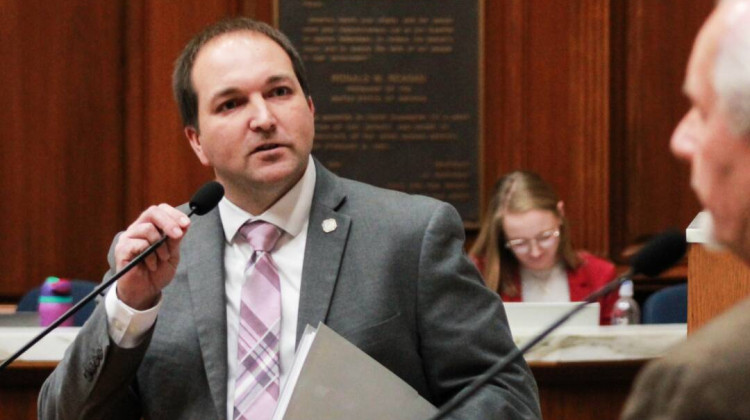
The proposed Senate Bill 12 moves to the full Senate after a 7-4 approval in the Senate Judiciary Committee on Wednesday, Feb. 15, 2023. The bill would strip Indiana’s school librarians and teachers of a legal defense against charges that they disseminated harmful material to minors.
Eric Weddle/WFYILawmakers, parents and educators argued for hours Wednesday over a bill that would prevent school teachers and librarians from using educational value as a defense against prosecution on charges that they disseminated material that is harmful to minors. The measure passed out of the Senate Judiciary Committee on a 7-4 vote.
The hearing featured passionate testimony from parents, religious and union leaders, librarians and attorneys. Parents who expressed support for Senate Bill 12, which was authored by Sen. James Tomes (R-Wadesville), claimed that pornography was rampant in schools across the state, and that school administrators and school boards had done little to address the issue.
Tomes, who tried and failed to pass similar legislation in recent years, said he had again authored this bill because of parent concerns about pornography in schools. He said the bill is not intended to ban or censor books.
“It's not gonna fix everything, but at least it will take away the argument as a defense that it's educational,” Tomes said.
Opponents of the legislation argued that it would leave school librarians and teachers open to criminal prosecution for providing books to students like Alice Walker’s “The Color Purple” and John Steinbeck’s “The Grapes of Wrath” due to the sexual content they included. They also feared that the legislation would have a chilling effect on school library collections, because school staff may fear that including certain books could lead to a criminal complaint.
The proposed legislation is part of a larger ongoing conflict in education over fundamental disagreements about how schools should address issues of gender, sexuality and race. Republican lawmakers have filed numerous bills this session to restrict or bar these topics in the classroom. This also comes as a recent poll conducted by the Indiana Department of Education and Gallup found most Indiana parents are satisfied with their child’s school.
Confusion in the hearing
The hearing also featured a great deal of confusion around proposed amendments. In the end, an amendment by Sen. Liz Brown, a Fort Wayne Republican who chairs the committee, passed 8-3 to create a grievance process for parents to submit complaints about material they found objectionable and remove “educational” from the statutory defense. The amendment would also require schools to maintain a publicly available list of all books in their libraries.
This means that if a prosecutor charged a teacher or school librarian with disseminating material that is harmful to minors, the school teacher or librarian would not be able to argue that the material had educational value as a defense.
Brown emphasized that the law would still allow them to argue that the material has literary, artistic, political or scientific value. She said existing law already makes it illegal to distribute obscene materials, and the law also spells out what is considered harmful to minors.
‘Putting the burden on parents’
More than a dozen people testified in favor of the bill as it was originally written — which did not include the grievance procedure. Many of them were parents, and some represented controversial conservative groups like Moms for Liberty and Purple for Parents.
“I mean, you guys have a misperception, I think, about how many books, how big this problem is. These are not parents overreacting,” said Amanda Tokos, a chair of a local chapter of Moms for Liberty, and a conservative who lost her bid to win a seat on the Southwest Allen County school board last year. She said the complaint process included in the amendment is “putting the burden on parents.”
Some of those who spoke out in favor of the bill as originally written claimed that the complaint process would not solve their problems.
“Surely you can see your policy that empowers parents to remove obscene literature is designed to keep it in,” said Noble County parent Bret Carpenter. He said the process laid out in the amendment would leave parents “bogged down in red tape.” He added that “public schools have become the principal place of sexualizing kids in our society.”
Brown argued that the grievance process gives parents an opportunity they otherwise wouldn’t have.
“This adds another opportunity for you to make them look at the book, respond to you, and then you can actually go to the school board and you can make the school board actually go on record making a decision, good book, bad book,” Brown said. “You can still sue, this does not prevent you.”
‘Different life experiences’
The 8-3 vote on the amendment broke across party lies, with Democrats voting against it as clarified.
Gail Zeheralis, from the Indiana State Teachers Association, said the organization supports the grievance procedure for parents. But she said they don’t support removing the word “educational” from the statutory defense.
Sen. Greg Taylor (D-Indianapolis) provided the example of the young adult novel “The Hate U Give” by Angie Thomas, which explores police violence and racism. The book is frequently challenged and sometimes banned from school libraries. He said the book and the film that was based on it helped him process some of the trauma he had experienced in his own life.
“One thing that's educational to one person is not educational to every person, because we all have different life experiences,” Taylor said. “And what troubles me the most is we're trying to make these life experiences fit in this box.”
Chad Heck, advocacy co-chair of the Indiana Library Federation and a Pike High School librarian, said that this proposed bill likely won’t result in many prosecutions. But he worries that the passage of it may prevent librarians from adding certain books to their collections.
“We need to preserve this defense so that our librarians feel safe to represent the diverse values of our communities, and patrons and students in our schools,” Heck said.
When asked by Sen. Scott Alexander (R-Muncie) why so many parents had concerns about pornography in schools, Heck said that it comes down to a “disagreement in values.”
“I've talked to the AG’s office yesterday and they've received multiple complaints from all over the state,” Alexander said. “So this is a problem and what we're trying to do is address it.”
Heck said local school boards should be the arbiters of what material should and should not be offered to students in schools. And if parents are unhappy with their decisions, “the result of that should be an election.”
Sen. Rodney Pol (D-Chesterton) said he supported a process to allow parents to submit complaints. But he said removing a defense for educational value is a step too far.
“I never thought as a member of this legislature, I'd be voting on a measure to put librarians in jail,” he said. “And that to me is pretty wild.”
Sen. Sue Glick was the sole Republican to vote against passing the bill out of committee and on to the full Senate for first reading. She said the process should move slower given that Tomes was unhappy with the bill in its current form.
The three Democrats on the committee also voted against the measure.
Contact WFYI education reporter Lee V. Gaines at lgaines@wfyi.org. Follow on Twitter: @LeeVGaines.
 DONATE
DONATE








 Support WFYI. We can't do it without you.
Support WFYI. We can't do it without you.